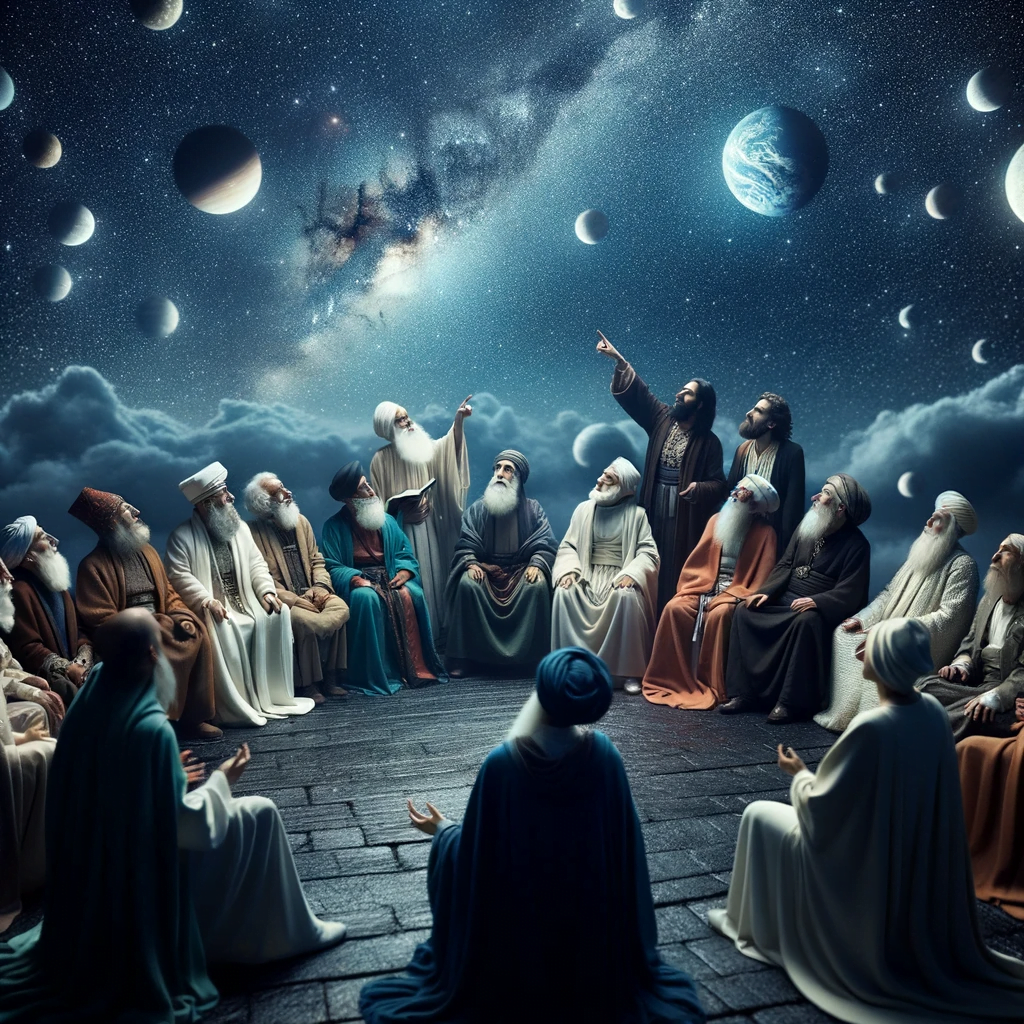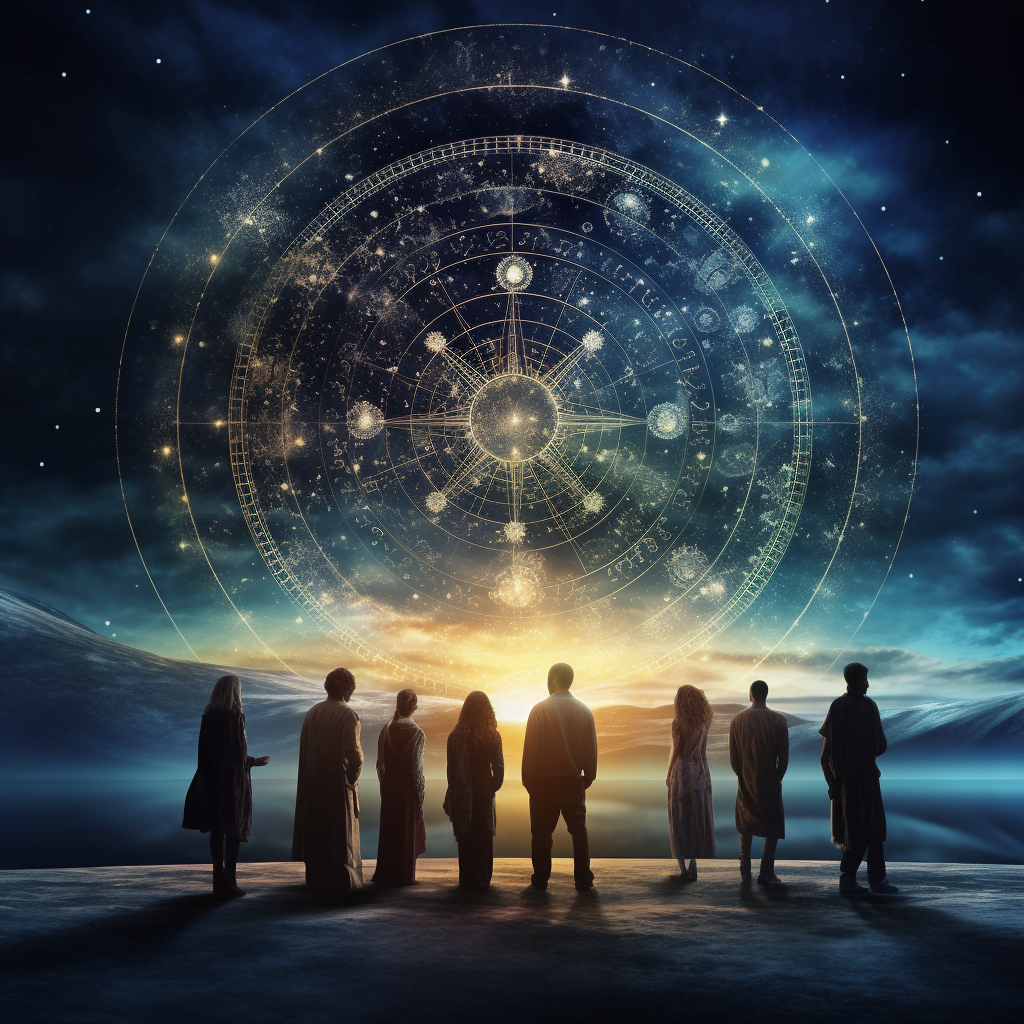Astrology, an ancient and intricate system of divination based on celestial phenomena, has been a topic of fascination for countless generations. But what ignited the birth of this complex belief system? To unravel this enigma, we must trace back to the origins of human civilization, when our ancestors looked up at the night sky in search of meaning and purpose. This article seeks to explore the origins of astrology and unravel the motivations behind its creation, shedding light on the profound impact it has had on human culture and history.
The Origin of Astrology
Astrology, one of humanity’s oldest and most enduring practices, originated in ancient civilizations and has been shaped and developed over centuries. By studying celestial bodies, ancient cultures sought to understand the nature of the cosmos and its influence on human life. With a systematic approach, astrology emerged as a complex system of beliefs and practices that encompassed both divination and the quest for knowledge and control. Through its evolution in various cultural contexts, astrology has left an indelible mark on art, literature, politics, and even our modern popular culture.
Early Beginnings of Astrology
The ancient origins of astrology can be traced back to Mesopotamia, where it began around the 3rd millennium BCE. In this region, clay tablets dating back to the 2nd millennium BCE contain astronomical observations and interpretational texts, showcasing early attempts to understand the relationship between the movements of celestial bodies and earthly events. These early astrologers focused on studying and recording the movements of the Sun, Moon, and planets, as well as noting significant celestial events like eclipses and comets.
The Influence of Ancient Civilizations
Astrology spread beyond Mesopotamia, influencing various ancient civilizations such as the Egyptians, Greeks, and Romans. These civilizations adopted and adapted astrological practices to suit their cultural and religious beliefs. In Egypt, astrology played an integral role in the worship of their gods and the pharaohs, with priests using celestial observations to divine the future and guide religious rituals. In Greece, astrology became entwined with Greek philosophy, with prominent thinkers like Pythagoras and Plato incorporating astrology into their teachings.
Development of Astrology in the Middle Ages
During the Middle Ages, astrology experienced significant development as it merged with Arabic astronomical knowledge and the teachings of Greek philosophers. Arab astronomers, such as Al-Kindi and Al-Biruni, furthered the study of astrology by translating and interpreting ancient texts, adding their own insights and discoveries. Astrology in the medieval period became closely intertwined with astrology, with astrologers being consulted by both commoners and royalty alike for guidance on important matters.
Ancient Beliefs and Practices
The Connection Between Sky and Earth
In ancient cultures, there was a strong belief in the interconnectedness of the celestial realm and earthly life. The movements and positions of celestial bodies were seen as indicators of the divine will and cosmic order. The Sun, as the center of the universe, was particularly revered, symbolizing life, vitality, and power. The phases of the Moon were also considered significant, with their cyclical nature reflecting the ebb and flow of tides, seasons, and human emotions.
The Role of Divination in Ancient Societies
Divination, the practice of foretelling the future or gaining insight through supernatural means, played a crucial role in ancient societies. Astrology was one of the primary methods of divination used, alongside practices such as augury (interpreting bird behavior), reading entrails, and interpreting celestial omens. Astrologers believed that the alignment and movements of celestial bodies held clues about the future and could provide guidance for decision-making.
Early Astrological Systems
As astrology developed in ancient civilizations, various systems and techniques emerged. The Babylonians, for example, developed an intricate system of celestial omens, linking specific celestial events to corresponding events on Earth. This system laid the foundation for later astrological practices. In Greece, the zodiac was developed as a way to divide the celestial sphere into twelve equal parts, each associated with specific personality traits and characteristics. These early systems set the stage for the future refinement and expansion of astrology.
The Quest for Understanding and Predicting
Human Desire for Knowledge and Control
Throughout history, humans have harbored a deep-seated desire to understand the world around them and to gain a sense of control over their lives. From the earliest civilizations, astrology provided a framework for comprehending the universe and one’s place within it. By studying and interpreting celestial events, individuals sought to gain insight into their personal lives, as well as the broader forces shaping their societies.
Using Celestial Events as Guides
Celestial events, such as eclipses, planetary alignments, and comets, were seen as significant signs from the heavens. Ancient astrologers believed that these events offered glimpses into the divine plan, providing opportunities to predict and navigate future events. The appearance of a comet, for example, was often interpreted as a premonition of a significant event or a change in leadership. By observing and interpreting these events, astrologers sought to understand and anticipate the unfolding of history.
Patterns and Associations in Nature
Astrology’s understanding of the cosmos extended beyond celestial events to encompass the natural world. Astrologers observed patterns and associations between celestial bodies, seasons, weather, and natural phenomena. They developed correspondences between planetary movements and the behavior of animals, plants, and even human personalities. These connections formed the basis of astrological interpretations and contributed to the belief in cosmic harmony and interconnectedness.
Early Astrology and Astronomy
The Convergence of Astrology and Astronomy
In ancient times, astrology and astronomy were inseparable. Observation of celestial bodies and events were the foundations of both disciplines. While astrology focused on the interpretation of these observations for divination and understanding human life, astronomy sought to unravel the physical laws and movements of celestial bodies. Early astronomers often doubled as astrologers, with their discoveries and calculations influencing astrological predictions and calendar systems.
Astrological Observations and Calendars
Astrological observations were crucial in determining auspicious times for various activities. Astrologers developed calendars based on the movements of the Sun, Moon, and planets, helping individuals plan events, harvest crops, or conduct religious ceremonies. By aligning their actions with astrologically favorable periods, ancient societies believed they could enhance their chances of success and avoid potential pitfalls.
Influence of Astronomical Discoveries on Astrology
As astronomy advanced, with the development of instruments like the astrolabe and the refinement of mathematical calculations, new discoveries were made that challenged traditional astrological beliefs. The discovery of new planets beyond the classical ones known to ancient astrologers, such as Uranus and Neptune, raised questions about their significance and role in astrological interpretations. These new celestial discoveries prompted astrologers to adapt and integrate them into existing astrological frameworks.
Cultural Significance of Astrology
Religious and Spiritual Importance
Astrology’s influence extended beyond practical applications; it had profound religious and spiritual connotations in many cultures. Ancient societies believed that celestial bodies were intimately connected to deities, who were responsible for shaping the destiny of individuals and nations. By delving into astrological practices, individuals sought divine guidance and attempted to align their lives with cosmic forces. Astrology served as a means to foster spiritual connection and attain a deeper understanding of the divine plan.
Astrology’s Role in Medicine
Astrology also played an instrumental role in ancient medical practices. The concept of “medical astrology” emerged, asserting that the positions and configurations of celestial bodies at the time of a person’s birth influenced their health and predispositions towards certain illnesses. Astrological medicine helped physicians diagnose and treat ailments, as well as determine auspicious times for medical procedures and the administration of remedies.
Astrology and Royal Court Influence
Throughout history, astrology had a significant impact on royal courts and political decision-making. Kings, emperors, and rulers would often consult court astrologers before embarking on important endeavors, such as declaring wars, making alliances, or even choosing their successors. Astrologers had considerable influence over these decisions, and their advice was sought in interpreting celestial signs and determining the most opportune moments to act.
Psychological and Emotional Aspects
The Craving for Meaning and Connection
Astrology satisfies the human yearning for meaning and connection in a vast universe. As beings driven by a desire to understand our place in the grand cosmological tapestry, astrology offers a framework through which we can find personal significance and relate to something greater than ourselves. This quest for meaning fuels our fascination with astrology and its enduring appeal.
Personality Traits and Zodiac Signs
One of the most well-known aspects of astrology is the association of personality traits with zodiac signs. Each zodiac sign is believed to possess distinct characteristics and behaviors, with astrologers using them to delineate the unique qualities of individuals. The interpretation of birth charts, based on the alignment of celestial bodies at the time of birth, is used to provide detailed insights into an individual’s personality, strengths, and weaknesses.
Astrology as a Tool for Self-Reflection
Astrology provides individuals with a tool for self-reflection and personal growth. By examining their birth charts and consulting astrological interpretations, people seek to gain a deeper understanding of their own motivations, strengths, and challenges. Astrology encourages individuals to explore different aspects of their personality and consider how cosmic influences may shape their lives, fostering a sense of self-awareness, and the potential for personal transformation.
Astrology in Socio-Political Contexts
Astrology and Political Decisions
Astrology has played a role in shaping political decisions throughout history. Political leaders, seeking an advantage in uncertain times, have turned to astrologers for guidance. Astrologers have been consulted in matters of governance, warfare, and policy-making, as they interpreted celestial signs and offered predictions of potential outcomes. While the influence of astrology on politics waxed and waned over time, its impact on political decision-making cannot be ignored.
Astrology as a Social Bonding Tool
Astrology has served as a social bonding tool, fostering connections and shared experiences among individuals. In societies where astrology is popular, discussions of zodiac signs, birth charts, and astrological predictions create a common ground for conversation and understanding. It provides a shared language through which people can relate to one another, reinforcing social cohesion and fostering a sense of community.
Astrology’s Role in Historical Events
Astrology has been linked to historical events in various ways. In ancient civilizations, astrologers’ predictions and interpretations often influenced decisions, ultimately shaping the course of history. For example, the birth chart of Alexander the Great was said to have been interpreted by ancient astrologers, who predicted his future conquests. Additionally, major historical events, such as the French Revolution and the rise of Nazism, have been associated with astrological symbolism and interpretations.
Astrology as a Predictive System
Prophecy and Fate
One of the fundamental aspects of astrology is its role in prophecy and the belief in predetermined fate. Astrologers interpret celestial events and birth charts to make predictions about future outcomes. The alignment of planets, the movement of celestial bodies, and the intricate calculations derived from complex astrological systems are believed to offer glimpses into the future, indicating the unfolding of events and the shaping of an individual’s destiny.
Astrological Charts and Interpretation
Astrological charts, also known as natal charts or horoscopes, serve as the cornerstone of astrological predictions and interpretations. These charts depict the positions of celestial bodies at the exact time and location of an individual’s birth. Astrologers analyze these charts, taking into account the precise positions of planets, signs, and houses, to gain insights into an individual’s personality, strengths, challenges, and future prospects.
Astrology’s Influence on Personal and World Events
Astrology, with its predictive nature, has influenced both personal decisions and world events. Individuals often seek astrological guidance when facing major life choices or transitions, such as marriage, career changes, or financial investments. Astrology’s impact on world events can be witnessed through the decisions and actions taken by leaders, who consult astrologers to make strategic moves in light of celestial influences. In both cases, astrology serves as a tool to navigate uncertainty and seek a glimpse of what lies ahead.
Astrology’s Resurgence and Popularity
Modern Astrology and Pop Culture
Astrology has experienced a resurgence in popularity, particularly in the modern era of pop culture. It has become a staple of horoscopes found in newspapers, magazines, and online platforms. Many people turn to astrology as a form of entertainment, eagerly devouring daily, weekly, or monthly forecasts that offer a glimpse into their future. Astrological memes, social media discussions, and celebrity astrologers have further propelled astrology into the mainstream, capturing the fascination of a wide audience.
Astrology in Online Spaces
The advent of the internet and social media platforms has provided astrology with a new avenue for dissemination and exploration. Various websites, forums, and apps offer personalized birth chart interpretations, horoscopes tailored to individual zodiac signs, and platforms for astrological discussions. The online space has facilitated the sharing of astrological knowledge, the formation of online communities, and the accessibility of astrology to a global audience.
The Appeal of Astrology Today
In the modern world, astrology holds a unique allure for individuals seeking meaning, guidance, and self-discovery. It offers a sense of reassurance in the face of uncertainty and a way to connect with something larger than themselves. The personalized nature of astrological interpretations, combined with the ease of access to astrological resources, contributes to its continued appeal and enduring popularity in contemporary society.
Astrology’s Enduring Legacy
Astrology’s Continued Relevance
Despite being an ancient practice, astrology’s relevance in contemporary society remains palpable. As long as humanity grapples with questions of purpose, meaning, and destiny, astrology will continue to provide a framework for seeking answers. Its ability to adapt to various cultural contexts and encompass both divination and self-reflection ensures its enduring presence in the human experience.
Impact on Art, Literature, and Culture
Astrology’s influence extends beyond the realm of belief and practice; it has left an indelible mark on art, literature, and culture. Throughout history, artists and writers have drawn inspiration from astrological symbols and themes, incorporating them into their works. Astrology has shaped the visual arts, ranging from ancient cave paintings depicting celestial bodies to Renaissance paintings infusing astrology into the composition. In literature, astrological references and symbolism abound, enriching narratives and evoking deeper meanings.
Future of Astrology
As our understanding of the cosmos deepens and technological advancements continue to reshape our world, astrology may evolve in unforeseen ways. The integration of new astronomical discoveries, such as exoplanets and cosmic phenomena, may expand the boundaries of astrological knowledge. Additionally, advances in data analysis and artificial intelligence may redefine how astrological interpretations are generated and personalized. While its future evolution may be uncertain, astrology’s enduring legacy ensures its continued presence in human history and culture.



